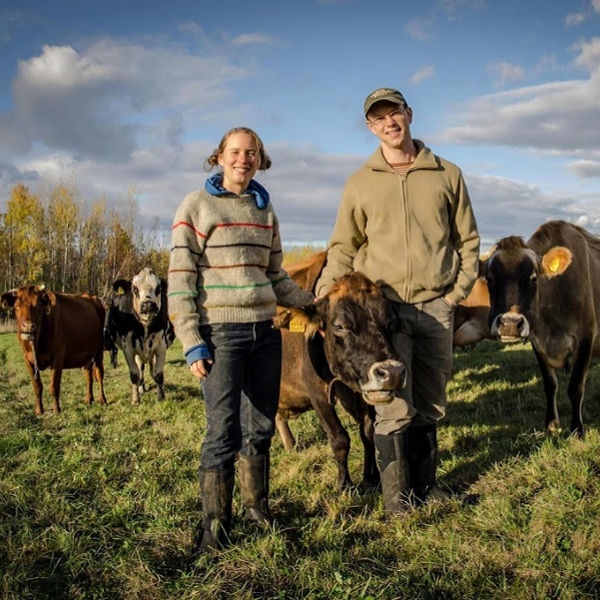Cover photo from left to right of Ashlee Kleinhammer and Steven Googin. All photographs courtesy of North Country Creamery
Ashlee Kleinhammer and Steven Googin are in the business of nurturing people, as well as cows.
Co-founders of North Country Creamery in Keeseville, New York, Ashlee and Steven are first-generation dairy farmers supplying raw milk, handmade cheeses, and cream-line yogurt to their North Country community.

Ashlee grew up in Morro Bay California, holds an Environmental Studies degree from Lewis and Clark College, and spent a semester on farms in Central America. Though she was involved in environmental pursuits throughout college, her semester abroad sparked a realization that farming was her path. She began her agricultural career in 2004 and has not paused since.
After graduating from college, Ashlee learned of the New York farm scene and moved across the country to work at Hawthorne Valley Farm in Ghent, NY. She started off in an educational position, working on farms teaching children about farm systems and agriculture. She honed in on dairy farming as a passion and, in 2013, took ownership of North Country Creamery with her partner, Steven.
We spoke with Ashlee about her dairy farm and the way that she nurtures her passion, her animals, and her community.
NEW YORK MAKERS: What was it about dairy farming that attracted you?
ASHLEE KLEINHAMMER: What I love most is the daily connection with the animals. I like routines, I like consistency, and I love being around the cows. I like making yogurt and cheese, although cheese requires a lot of time spent inside. What I really love most is implementing grazing practices and connecting with the animals.
NYM: Was there anyone who inspired you early on?
AK: I had previous dairy experience at Hawthorne Valley farm, which was a biodynamic dairy. There was a really badass herdswoman named Judith, and she really inspired me. I thought, ‘Wow. This is amazing.’ I really had sheer admiration for her and what she was doing.
NYM: How did you take ownership of your farm?
AK: Before I actually bought it, I wasn’t sure that I could do it. I had never been in charge of an entire dairy operation before. At first, when I started farming, I thought I would always be more comfortable working for others or managing farms; but then this opportunity presented itself, and I had a change of heart.
I heard that this farm had been for sale. It was just the right size, and it was already set up to make cheese. It was the perfect opportunity. It felt like all of the stars had aligned. The other really fortunate thing was that the Open Space Institute was offering easements for farms. They took money off of the purchase price as long as we didn’t subdivide the land, which we weren’t intending to do anyway. It was the perfect rent-to-own situation. We took out a regular mortgage after five years and had the chance to figure out markets and everything else in the meantime.

NYM: How did you and Steven meet each other?
AK: We started dating the winter before taking ownership of the farm. I’d had a few potential business partners who had backed out of co-owning for various reasons, and Steven was adventurous enough to actually take it on with me!
NYM: Did Steven have previous experience farming?
AK: Steven grew up on a homestead and was surrounded by farming so it was something familiar to him, but he didn’t become inspired to do it himself until the time period during college and right after. We met each other working in Cazenovia, New York, the town where Steven grew up, working at Greyrock Farm. Greyrock Farm was started by Matt Volz, an early employee of Essex Farm, in Essex, New York, and Steven was the one who introduced him to the land that became Greyrock Farm. It’s a really intertwined community!
NYM: Did you have previous experience making cheese?
AK: I had made yogurt before, but not in a commercial capacity, and I actually learned to make cheese at North Country Creamery — our farm. We got a grant during the first year, which was really wonderful, and were able to hire the previous owner as a mentor. He knew everything about the setup and about the cheesemaking process, and he taught us how to do it. I was so happy to be able to learn from him, and I always enjoy being able to pay that forward by teaching aspiring dairy producers how to get started.

As we all know during these times, sanitation is really crucial. With cheesemaking, the level of sanitation is extreme. None of the current pandemic precautions are new to cheesemakers. We have a really deeply ingrained knowledge of bacteria and the lengths required to prevent it from spreading.
NYM: Tell us about your cows.
AK: Our herd of cows is entirely grass fed. We have low input, low output cows. The way that we work mimics the New Zealand model of dairy farming. We do a lot of rotational grazing, letting the cows move to different pastures all the time, and we only milk once per day. We don’t give our animals any corn or soy and their genetics back it up — they are meant to thrive on grass. The breeds we have aren’t meant to produce tons of milk like the black and white Holstein cows that you see. Our cows make a moderate amount of milk and also are good for beef. We have Jerseys and Shorthorns. We also have some Normande, which is a breed from Normandy, France. They have a really nice butterfat to cream ratio.

NYM: Are these breeds of cow the reason why your yogurt has such an amazing layer of cream on top?
AK: Yes! The breed of cow and their diet determines the butterfat content. Traditional Holstein cows have a really low percentage of butterfat. Ours are much higher. And it also has to do with the fact that we practice rotational grazing. It produces a different kind of milk than what you’d see from a cow that stays in the barn. We have 30 cows and are milking about 15 of them.
NYM: How do you treat cows for ailments?
AK: We are not certified organic but we follow organic practices. In caring for our animals, we use colloidal silver, udder liniment, essential oil fly spray, and various salves that we make ourselves on the farm. When our cows get mastitis, which is a constant concern, we use a homemade garlic tincture on them to boost their immune systems and we give them a lotion made with peppermint, cedar, and clove essential oils that we massage in to work out the mastitis. They also get a vitamin C injection. We also use a homemade oregano oil infusion. We do all of this instead of just reaching for the antibiotics. And it works most of the time.
We will use antibiotics to save the life of a cow because I’d do the same for myself but this is one of the reasons that we’re not certified organic. To be certified, you can’t use antibiotics even once. If you do, you have to ship the cow to a conventional farm, and who knows what will happen to her there. We do have many other certifications. We’re Animal Welfare approved. We were practicing those standards already. But it goes to show that the certification is not as important as actually knowing the farm where the milk comes from.
NYM: Do you name your cows?
AK: Oh, yes. Every cow has a name and her own personality. Our cows are really special to us. They’re a very important part of our lives.



Leave a comment